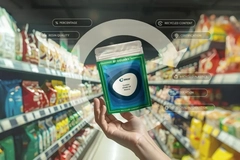Coca-Cola European Partners targets total decarbonization by 2040 with packaging and energy eco-initiatives

08 Dec 2020 --- Coca-Cola European Partners (CCEP) is announcing ambitions to become a net-zero carbon business by 2040 in alignment with the 1.5˚C climate change-limiting pathway and the Paris Climate Agreement.
The world’s largest independent Coca-Cola bottler is also accelerating its decarbonization by reducing absolute greenhouse gas (GHG) emissions across its entire value chain – including Scope 1, 2 and 3 emissions – by 30 percent by 2030 versus 2019.
Specifically, this entails a commitment to reduce Scope 1 and 2 GHG emissions by 47 percent and Scope 3 emissions by 29 percent by 2030 from a 2019 base year.
The beverage giant will reduce GHG emissions across all five areas of its value chain – ingredients, packaging, operations, transportation and refrigeration.

CCEP’s immediate action plan is supported by a three-year €250 million (US$303 million) investment, providing targeted financial support to decarbonize its business.
The company’s decarbonization targets are validated by the Science Based Target Initiative (SBTi). CCEP announced funding for CuRe “polyester rejuvenation” technology in July.
CCEP announced funding for CuRe “polyester rejuvenation” technology in July.
Supply chain emissions cuts
Crucially, there is a significant focus on reducing Scope 3 emissions via a commitment to support strategic suppliers setting their own science-based carbon reduction targets and using 100 percent renewable electricity.
“Rigorous, science-based, carbon reduction targets underpin our ambition. We will chart and report our progress – and we want to encourage more businesses to adopt this approach,” notes Damian Gammell, CCEP CEO.
“Our focus will be on reducing emissions across our entire value chain – from the raw ingredients we source and the packaging we use to the drinks we sell.”
“However, we can’t achieve this alone. Over 90 percent of our GHG emissions are related to the activities of our suppliers, so we will be supporting them to set science-based GHG emissions reduction targets by 2023 … [and] share their carbon footprint data with us.”
Recycled PET ramp-up
The €250 million (US$303 million) investment includes environmentally sustainable packaging initiatives, notably the progression of CCEP’s 100 percent recycled PET (rPET) roadmap and investing in the scaling of depolymerization technology.
CCEP announced funding in July for CuRe Technology – a recycling startup aiming to provide a new lease of life for difficult to recycle plastic polyester waste. CCEP adopted WestRock’s CanCollar paperboard-based ring technology in Spain.
CCEP adopted WestRock’s CanCollar paperboard-based ring technology in Spain.
Through its innovation investment fund CCEP Ventures, CCEP is enabling CuRe to develop its “polyester rejuvenation” technology from pilot plant to commercial readiness. Once the technology is commercialized, CCEP will receive the output majority from a CuRe-licensed, new-build plant in the Netherlands.
Paper-based packaging push
CCEP has also been busy replacing hard-to-recycle plastic rings and shrink film for multipacks with paper-based alternatives.
In August, the company adopted WestRock’s CanCollar paperboard-based ring technology for its multipack cans in the Balearic Islands, Spain. The PEFC-certified, recyclable and sustainably-sourced CanCollar replaces the current Hi-Cone plastic ring solution, saving more than 18 tons of plastic annually.
Similarly, CCEP introduced Graphic Packaging’s KeelClip minimalist paperboard packaging solution on multipack cans in Europe, replacing plastic wrap.
Coca-Cola is also supporting Paboco to invent a recyclable paper bottle for non-alcoholic stills and sparkling drinks.
The first-generation paper bottle prototype consists of a paper shell with a closure and liner made from rPET. However, the goal is to create a paper bottle without a plastic liner fully recyclable as paper.
Carbon offsetting considerations
As part of its journey to net-zero carbon emissions, CCEP says it will invest in projects which remove carbon from the atmosphere or verified carbon offset projects. Coca-Cola is supporting Paboco in developing a recyclable paper bottle.
Coca-Cola is supporting Paboco in developing a recyclable paper bottle.
However, the company will focus on reducing emissions “as far as possible” and “only offset where essential and where it can’t reduce emissions any further.”
“Over the last decade we have significantly decarbonized our business. We’ll explore how to make our manufacturing sites fossil-fuel free and will transition six of our manufacturing sites to be carbon neutral by the end of 2023,” continues Gammell.
“We have accelerated our ambition to use zero virgin oil-based PET in our plastic bottles within a decade … and we will innovate in refillable packaging and dispensed technology.”
“But we can and must do more. This is an important moment for our business. We are demonstrating our commitment to go even further and faster to help tackle climate change and create a better future.”
CCEP’s net-zero announcement comes as Break Free From Plastics’ Brand Audit 2020 Report finds Coca-Cola, PepsiCo and Nestlé as the three most plastic polluting FMCG companies for the third consecutive year.
By Joshua Poole












